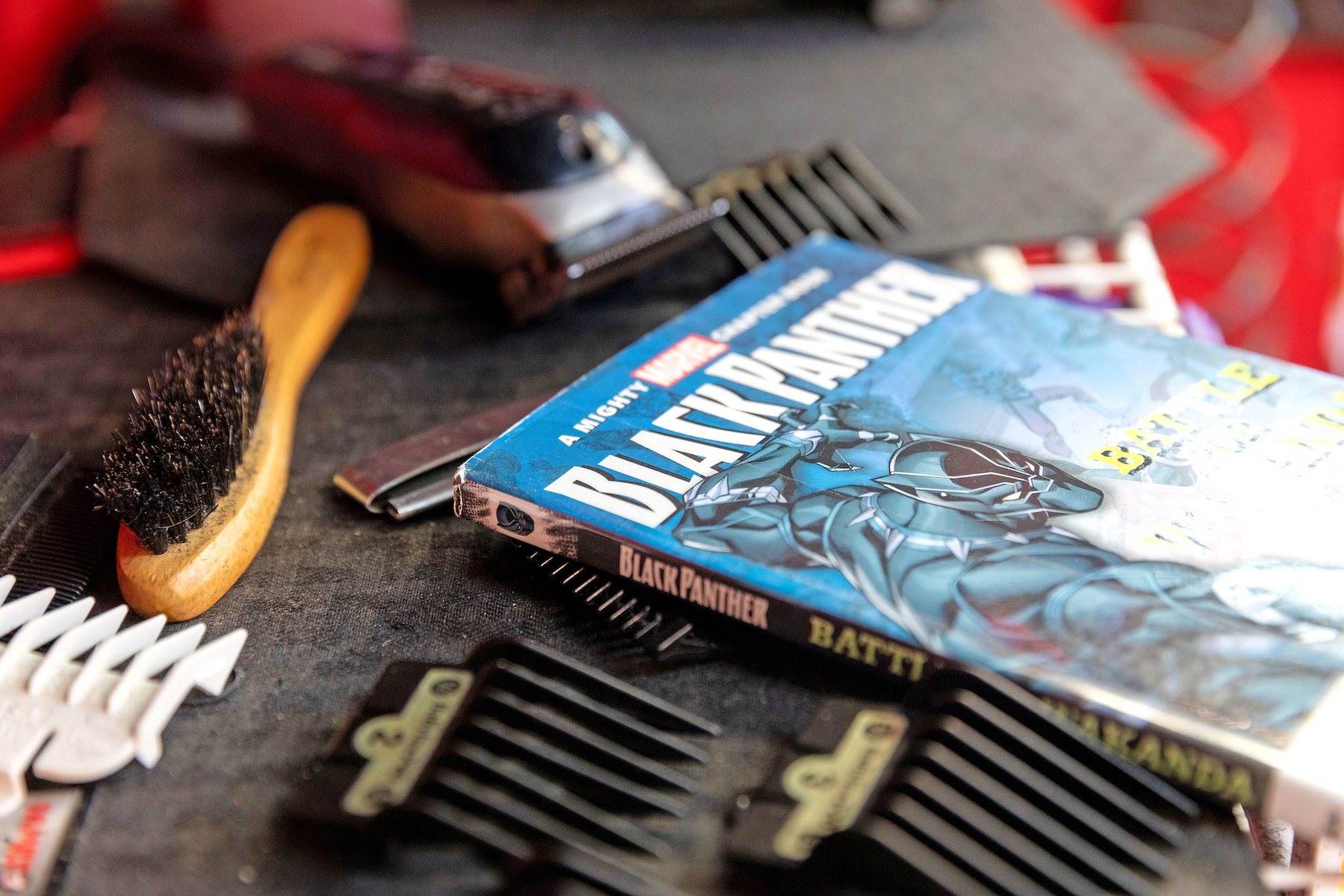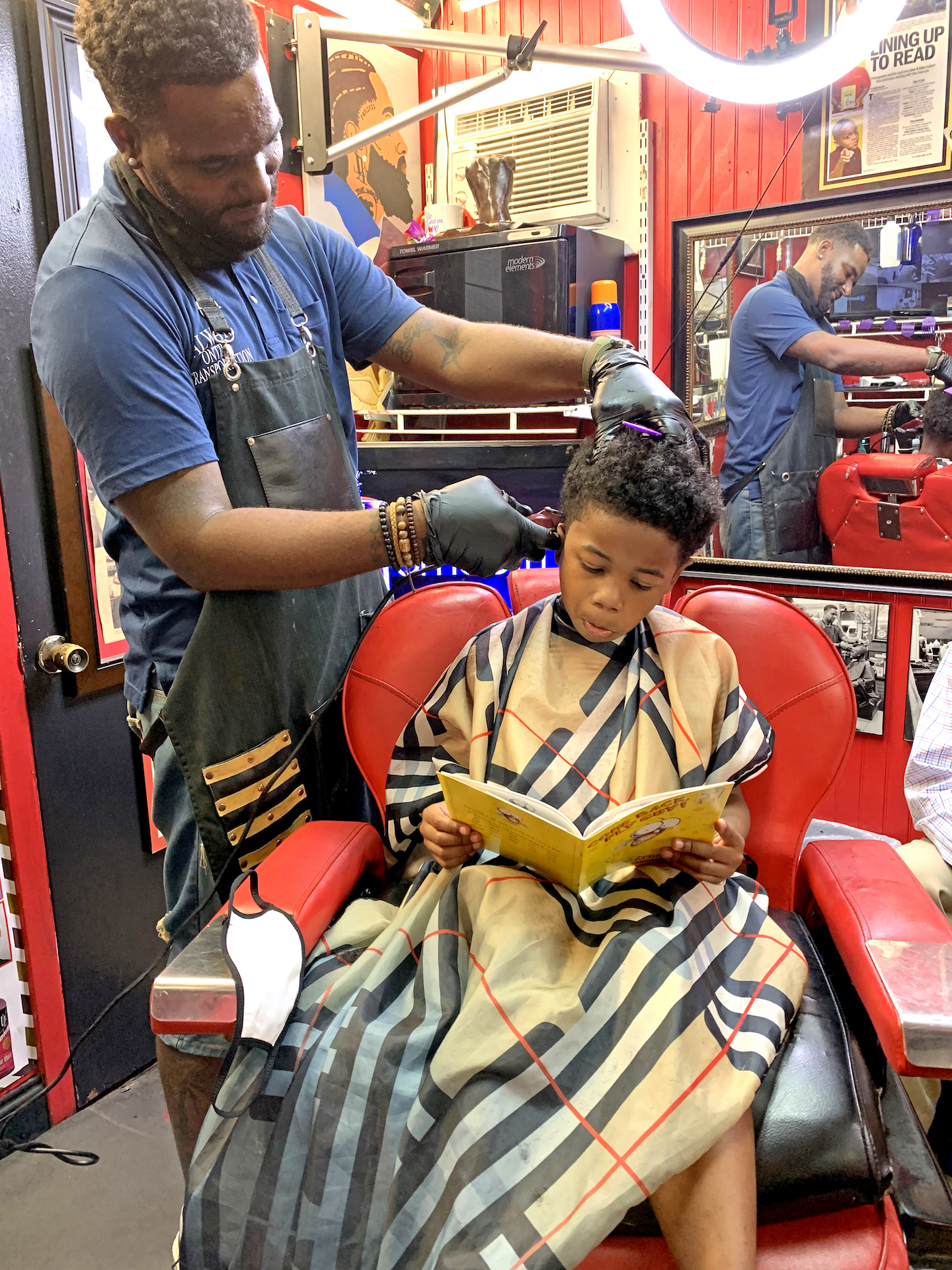
How the Line 4 Line program for young people combines reading with a haircut
The first Monday of each month at O’Neil’s Barber and Beauty Shop on North Acadian Thruway is like nothing you’ve seen at a salon before.
Children arrive for a free haircut, and the chance to work on their reading skills. Awaiting their turn, kids beeline for the bookshelves and tables sprinkled around the shop, where colorful titles promise exciting plots and interesting characters. Each child selects a book and sits down to read. By the time they scramble into the barber chair, the stories are really getting interesting.
As the haircut ensues, they’re expected to read aloud. The barbers know how to help with difficult words, or ask questions that reveal just how much the child has really read.
“I say things like, ‘What’s the story about? Tell me something to make me feel like I’ve read it,’” says shop owner O’Neil Curtis. “I can tell if they’re reading or not. Sometimes they say, ‘I’m reading silently,’ and I say, “‘No, read to me.’”
Welcome to Line 4 Line, the barber shop-based literacy program that Curtis, a neighborhood businessman and mentor, launched with volunteer Lucy Perera in 2014. Modeled after similar programs across the country, Line 4 Line addresses children’s literacy skills while building their social confidence through a free monthly haircut. The program serves about 200 kids from ages 3 to 16 every year.
“The reason why the program is so unique—and works so good—is that we really help them,” Curtis says. “These kids don’t have the money to get their hair cut, so we get them in for that. But really, we’re tricking them with a haircut, so we can mentor them and help them with their reading.”
The program started after Perera, then the coordinator of schools and community programs for the LSU Museum of Art, heard about similar initiatives nationwide. There was something about the comfort of the community barber shop that made children relax and get excited about improving their reading skills. Perera started looking for willing barbershops in Baton Rouge, and eventually found Curtis. Together, they began building the program. They made flyers to spark interest, and sourced books from the national Conscious Kid organization, which provides BIPOC-authored children’s literature to community programs as a way to combat racism.


“It’s important for kids to see themselves in the characters they read about, especially just doing normal everyday things,” says Perera, now director of learning innovation at the Knock Knock Children’s Museum.
Perera and Curtis also recruited volunteer tutors from Southern University to support children who are either too young to read on their own, or who need extra support. Currently, volunteers from Catholic High and St. Joseph’s Academy are also lending a hand.
After their haircut, kids leave the shop with a free book. It’s a big deal, the founders say, since most of the young clients live in homes with no books at all. Curtis says he grew up “rough,” in a single-parent household with three siblings and few resources.
“We didn’t own any books,” he says.
Over its nearly seven years in existence, Line 4 Line keeps evolving. It added a Saturday lending library, tucked in a building owned by Curtis just behind the North Acadian Thruway barber shop. And this summer, the program is launching a new book mobile with help from the Wilson Foundation and the Capital Area United Way. Outfitted with both books and a barber chair, it will bring the free haircut and reading program to kids around the community.
For older kids, Line 4 Line focuses on career education. Curtis mentors teens about what it takes to become a barber, a career that has brought him both joy and stability. He teaches a class at Capitol High School in which students practice barbering and beautician skills with real equipment. Curtis is hoping to grow the class into a full apprenticeship program that will give students a jumpstart on a barbering career after high school.
The apprenticeship program won’t be limited to Capitol High. Line 4 Line is one of the four nonprofit partners converting the former Sarkis Oriental Rug store on Government Street into a new youth-focused nonprofit consortium called Youth City Lab. The other partners include Big Buddy, Humanities Amped and Front Yard Bikes. Inside the 10,000-square-foot space, Line 4 Line plans to have a reading room filled with books, and a mock salon with a barber chair where teens can practice barbering skills.
Curtis says he relishes being able to change young lives.
“I get so much joy out of it,” he says. “We give them a high-class cut and book. They’re proud. There’s a shine to them when they leave.”
To find out more about the program and how to help, find Line 4 Line on Facebook and line4linebr.org.
